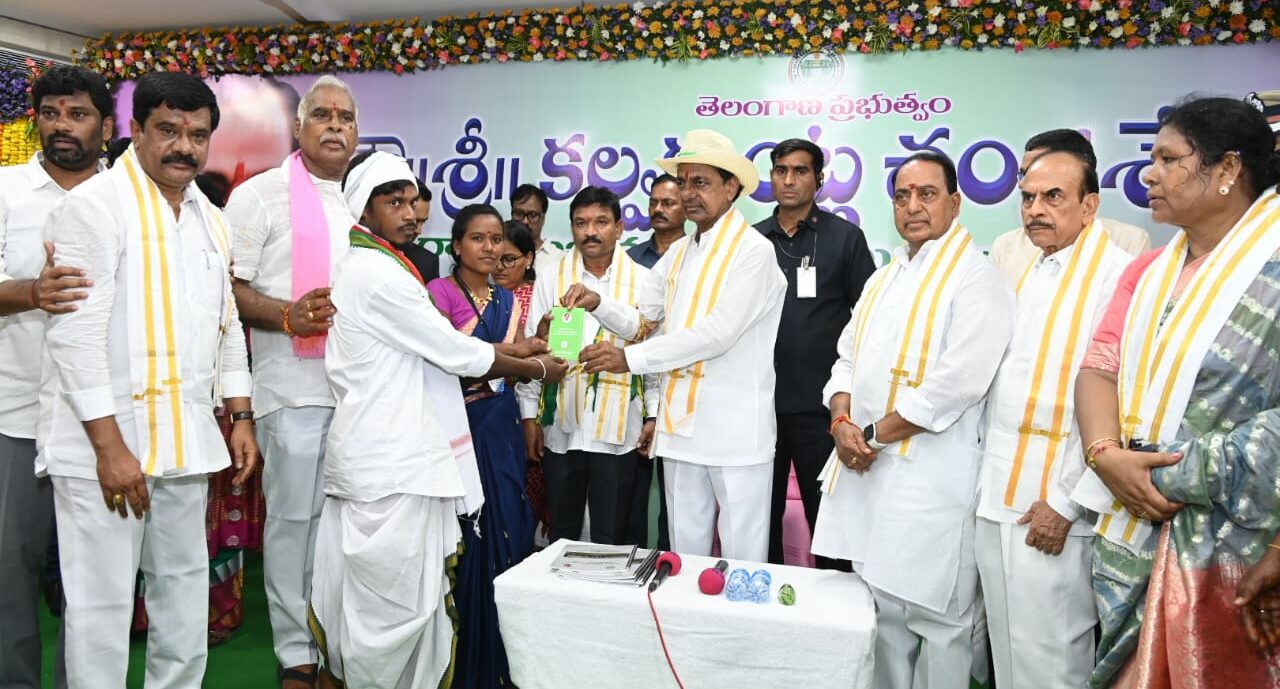What people prioritise between the spirit of the Telangana struggle and the urgency of local issues will be decisive for the young state in its third Assembly election.

KCR inaugurating the distribution of pattas for podu lands belonging to tribals. (Twitter)
India’s youngest state readies for its third Assembly election on 3 November.
The results of the first two elections in 2014 and 2018 left little scope for in-depth political analysis. A decade is too short to assess the depth of governance, study social realities concerning equity and justice, and comprehend the path of development the state has set itself on.
The usual elements are bandied about: Bringing irrigation to arid regions, schemes to uplift the impoverished, cash and food in the hands of the poorest of the poor, spread of infrastructure, education and health care services, digitisation, e-governance, IT hubs in the urban areas, and multipurpose projects in the rural areas.
But how vibrant is the spirit of the Telangana struggle as an election plank? This spirit of the struggle for a separate Telangana in 2014 put paid to the merger of all Telugu-speaking areas under the Visalandhra experiment.
Is the Telangana sentiment strong enough for the people to vote for Chief Minister K Chandrashekar Rao for a third time?
In 2014, despite Sonia Gandhi delivering Telangana, KCR got the votes as people realised that Telangana would not have become a reality but for him.
In 2018, the Telangana Rashtra Samiti (TRS, now Bharat Rashtra Samiti, BRS) was still seen as a party that had done nothing wrong for the people to ignore it. Instead, the Congress alliance with the TDP, seen by the people as anti-Telangana, tilted the scales in favour of KCR. TRS fared exceptionally well, far better than in 2014.
In the last few months, Chief Minister KCR, so known by his initials, has left no stone unturned to let the spirit of Telangana guide him to victory for the third time.
However, compelling reasons guard him from being complacent this time. What if people’s immediate concerns subsume the spirit of the Telangana struggle, and they vote on local issues?
Anti-incumbency is a strong factor militating against the fortunes of at least a third of BRS legislators. What if KCR is still strong at the Hustings but not strong enough to counter the anti-incumbency against his government and MLAs?
On the other hand, the Congress would remember how it sat on the Telangana dream for a long time and finally appeared gracious enough to deliver the new state when push came to shove. That was insufficient for the grand old party to reap political dividends in the 2014 elections.
It has since faced desertion in the ranks of even its MLAs. It was almost not in the contest in the 2018 elections. But, of late, following the Karnataka victory, the party appears to be in a better shape.
The party senses an opportunity in the forthcoming elections and is seen taking up people’s issues aggressively. The seasonal arrival of leaders from other parties changes its public perception. Its leaders appear to have set aside their differences for the time being and are working towards a better performance in the polls.
In contrast, the BJP may be slipping in the last few months for various reasons. A good draw of votes by the BJP can help the BRS win in a three-way contest.
However, some surveys claim the BJP’s vote is sliding this time, making the election a bipolar contest between the BRS and Congress.
The image of the BJP may inadvertently rub off negatively on the BRS as well. The public perception remains a bit suspect despite the openly hostile public posturing between the two parties’ leaders. The perception seems that the two parties might pursue like-minded strategies hidden under public animosity.
Such a perception has the potential to wean away the Muslim votes from the BRS. They voted for KCR all this while, but any suspicion of any relationship with the right-wing party can make the Muslim vote focus on the Congress.
It has to be seen how changing people’s perceptions about political parties, their immediate needs, and the larger-than-life spirit of Telangana shape the electoral fabric this time.

Jul 25, 2024

Jul 25, 2024

Jul 25, 2024

Jul 20, 2024

Jul 20, 2024

Jul 19, 2024